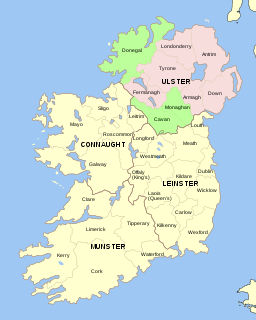
Scottish Gaelic or Scots Gaelic, sometimes also referred to simply as Gaelic, is a member of the Goidelic (Gaelic) language branch of the Celtic languages native to the Gaels of Scotland. A member of the Goidelic branch of the Celtic languages, Scottish Gaelic, like Modern Irish and Manx, developed out of Middle Irish. Most of modern Scotland was once Gaelic-speaking, as evidenced especially by Gaelic-language placenames.

Scots is the Germanic language variety spoken in Lowland Scotland and parts of Ulster in Ireland. It is sometimes called Lowland Scots to distinguish it from Scottish Gaelic, the Celtic language which was historically restricted to most of the Highlands, the Hebrides and Galloway after the 16th century. The Scots language developed during the Middle English period as a distinct entity.
Scotch is an adjective meaning "of Scotland". The modern usage in Scotland is Scottish or Scots, and the word "Scotch" is only applied to specific products, mostly food or drink, such as Scotch whisky, Scotch pie, Scotch broth, and Scotch eggs. "Scotch" applied to people is widely considered pejorative in Scotland, reflecting old Anglo-Scottish antagonisms, but it is still occasionally used in England and Ireland, though the usage is considered old-fashioned.
Lallans, is a term that was traditionally used to refer to the Scots language as a whole. However, more recent interpretations assume it refers to the dialects of south and central Scotland, while Doric, a term once used to refer to Scots dialects in general, is now generally seen to refer to the Mid Northern Scots dialects spoken in the north-east of Scotland.

Ulster Scots or Ulster-Scots, also known as Ulster Scotch, Scots-Irish and Ullans, is the Scots language as spoken in parts of Ulster in Ireland. It is generally considered a dialect or group of dialects of Scots, although groups such as the Ulster-Scots Language Society and Ulster-Scots Academy consider it a language in its own right, and the Ulster-Scots Agency and former Department of Culture, Arts and Leisure have used the terminology Ulster-Scots language.
Scottish English includes the varieties of English spoken in Scotland. The main, formal variety is called Scottish Standard English or Standard Scottish English (SSE). Scottish Standard English may be defined as "the characteristic speech of the professional class [in Scotland] and the accepted norm in schools". IETF language tag for "Scottish Standard English" is en-Scotland.

English, in various dialects, is the most widely spoken language of the United Kingdom, however there are a number of regional languages also spoken. There are 14 indigenous languages used across the British Isles: 5 Celtic, 3 Germanic, 3 Romance, and 3 sign languages. There are also many immigrant languages spoken in the British Isles, mainly within inner city areas; these languages are mainly from South Asia and Eastern Europe.
The Ulster Scots, also called Ulster Scots people or, outside the British Isles, Scots-Irish (Scotch-Airisch), are an ethnic group in Ireland, found mostly in the province of Ulster and to a lesser extent in the rest of Ireland. Their ancestors were mostly Protestant Presbyterians Lowland Scottish migrants, the largest numbers coming from Galloway, Lanarkshire, Renfrewshire, Ayrshire and the Scottish Borders, with others coming from further north in the Scottish Lowlands and, to a much lesser extent, from the Highlands.
"Craic" or "crack" is a term for news, gossip, fun, entertainment, and enjoyable conversation, particularly prominent in Ireland. It is often used with the definite article – the craic – as in the expression "What's the craic?". The word has an unusual history; the Scots and English crack was borrowed into Irish as craic in the mid-20th century and the Irish spelling was then reborrowed into English. Under either spelling, the term has great cultural currency and significance in Ireland.
This is a presentation of the phonological history of the Scots language.

Ulster English is a major variety of English spoken in most of the Irish province of Ulster and throughout Northern Ireland. The dialect has been influenced by the Ulster Irish and Scots languages, the latter of which was brought over by Scottish settlers during the Plantation of Ulster and subsequent settlements throughout the 17th and 18th centuries.
In Scotland, a wirry-cow[ˈwɪɾɪkʌu, ˈwʌɾɪkʌu] was a bugbear, goblin, ghost, ghoul or other frightful object. Sometimes the term was used for the Devil or a scarecrow.
Draggled sae 'mang muck and stanes, They looked like wirry-cows

A clootie is a strip or piece of cloth, a rag or item of clothing; it can also refer to fabric used in the patching of clothes or the making of proddy rugs.

The languages of Scotland are the languages spoken or once spoken in Scotland. Each of the numerous languages spoken in Scotland during its recorded linguistic history falls into either the Germanic or Celtic language families. The classification of the Pictish language was once controversial, but it is now generally considered a Celtic language. Today, the main language spoken in Scotland is English, while Scots and Scottish Gaelic are minority languages. The dialect of English spoken in Scotland is referred to as Scottish English.

The Scottish people or Scots, are a nation and Celtic ethnic group native to Scotland. Historically, they emerged from an amalgamation of two Celtic-speaking peoples, the Picts and Gaels, who founded the Kingdom of Scotland in the 9th century. Later, the neighbouring Celtic-speaking Cumbrians, as well as Germanic-speaking Anglo-Saxons and Norse, were incorporated into the Scottish nation.







